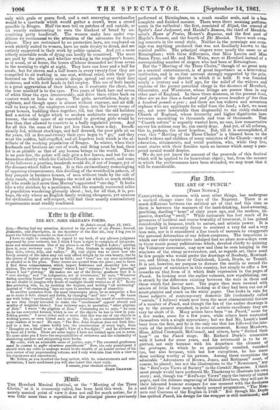rrttrr to t4r &tar.
THE REV. JOHN GRAHAMS POEMS.
St. John's-wood, Sept. 12, 1861. Sin.,—Having had my attention directed to the review of my Poems : Sacred, .Didactive, and Descriptive, in the Spectator of the 31st ult., may I beg you to insert the following remarks on that review?
I have no right to complain, in regard to my book, of any adverse judgment expressed by your reviewer, but I think I have a right to complain of misqnota- tions and misstatements. One of my pieces is on the " English Lakes ;" quoting from it, your reviewer says: " The Rev. John Graham is explaining why he likes trees, rivers, bills and valleys." My real object was to show how the lovely scenery of the lakes may not only afford delight by its own beauty, but be the mirror of higher glories seen by faith; and "trees" are not once mentioned or alluded to in the piece. Three verses are quoted from the piece ; and in them I find three misquotations, which import feebleness and absurdity into my diction. The reviewer has "stream" where I had " streams ;" he has " glancing" where I had " glowing." He makes me say of the Divine goodness that it is 4' ever daring;' and " in indignation, not in irreverence," he says, " Whatever daring spuniing bound" may mean, we confess we are unable to conjecture, as we are unable to imagine why floods of sunlight should remind us of it." In the line preceding this, he, by omitting the hyphen, and writing " all embracing" instead of " all-embracing," lays me open to another charge of absurdity. In another quotation from the same impromptu piece, he so misquotes a line as to make it both absurd and feeble, by changing "and" into " as." He taxes me with being " uneducated." Are these misquotations the result of carelessness, or are they simply intended to make the "uneducated" appear absurd and worthy of weightier blows? Your reviewer says, in quotation, " other pilgrims of Zion." I wrote "the pilgrims of Zion." Concerning me he says, " As soon as he has converted Ireland, which is one of the objects he has in view in pub- lishing poems." I never either said or wrote that this was one of my objects in writing poems, or even hinted such an idea. Sir, is such misstatement fair to your readers or to me? He says, "The Rev. John Graham does not limit him- self to a few, but enters boldly into the consideration of every topic, from Thoughts on a Skull' to an Angel's View of a Sea-fight;' " and he advises me to burn all I write. There are some topics I have not treated upon yet in verse. To some abler pen I leave the responsibilities of reviewers and the criminality of slandering authors and misquoting their books. My critic, with an admirable sense of justice, says, " The reverend gentleman mast be context to miler vicarious pumAment" Now, the only punishment I should wish my critic to undergo would be the trouble of an honest revisal of his own review of my unpretending volume, and I only wish him that with a view to his repentance and amendment.
Mr. Editor, as you inserted the long review, with its misstatements and mis- quotations, I have confidence you will also insert this short reply. I remain, your obedient servant,
JOHN Gassex.






























 Previous page
Previous page